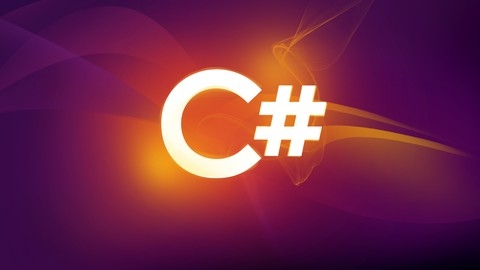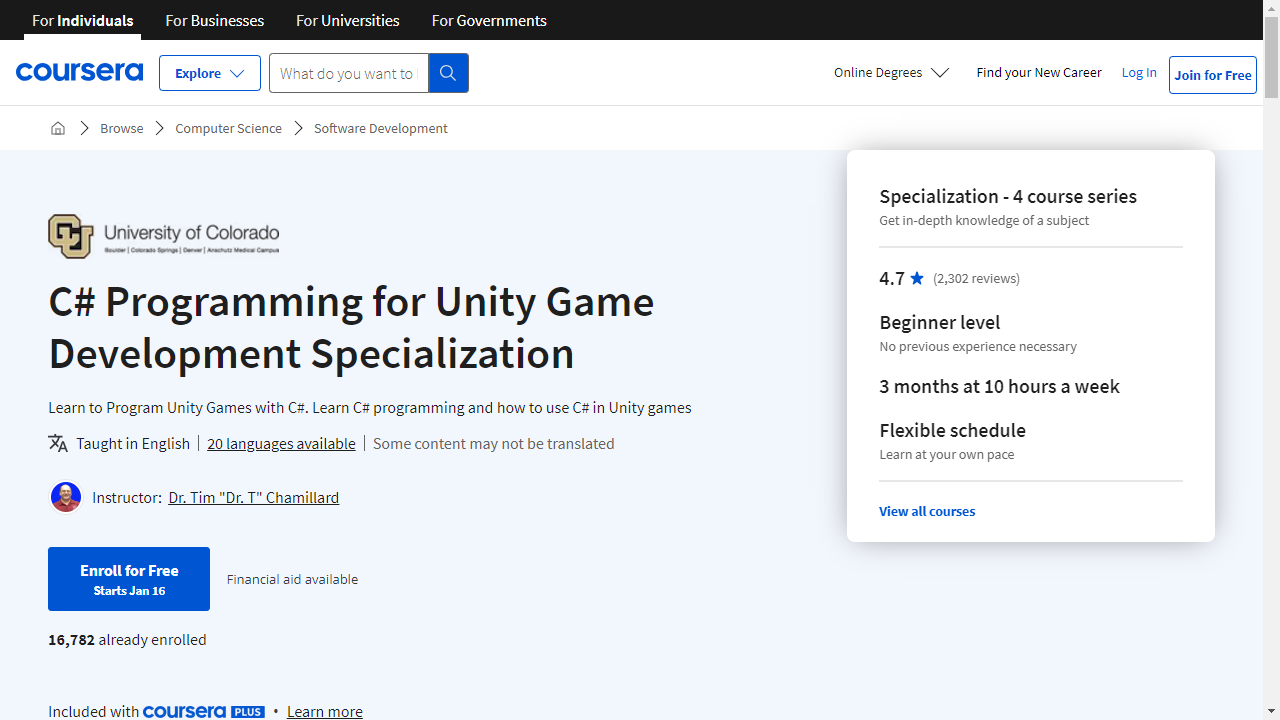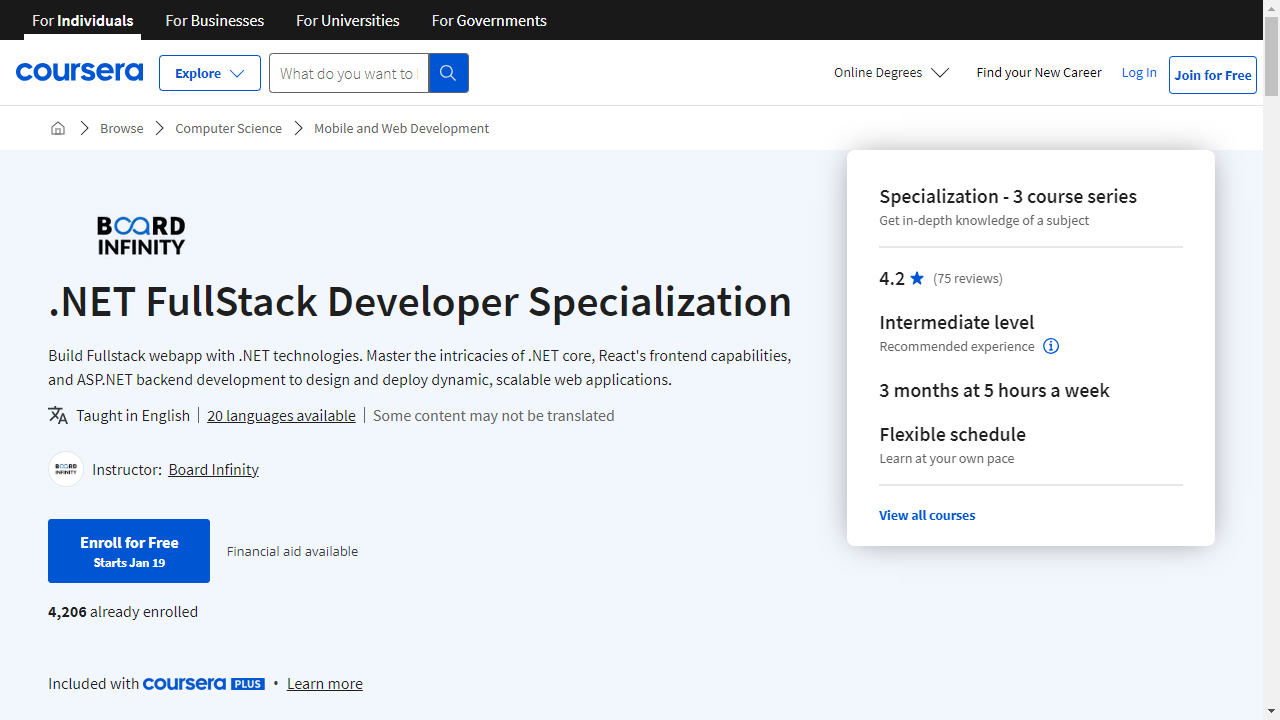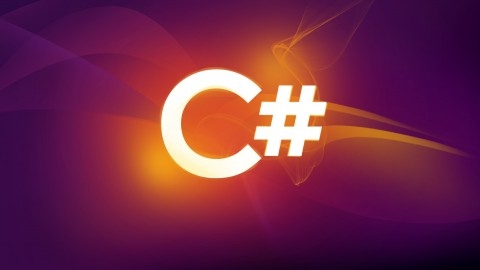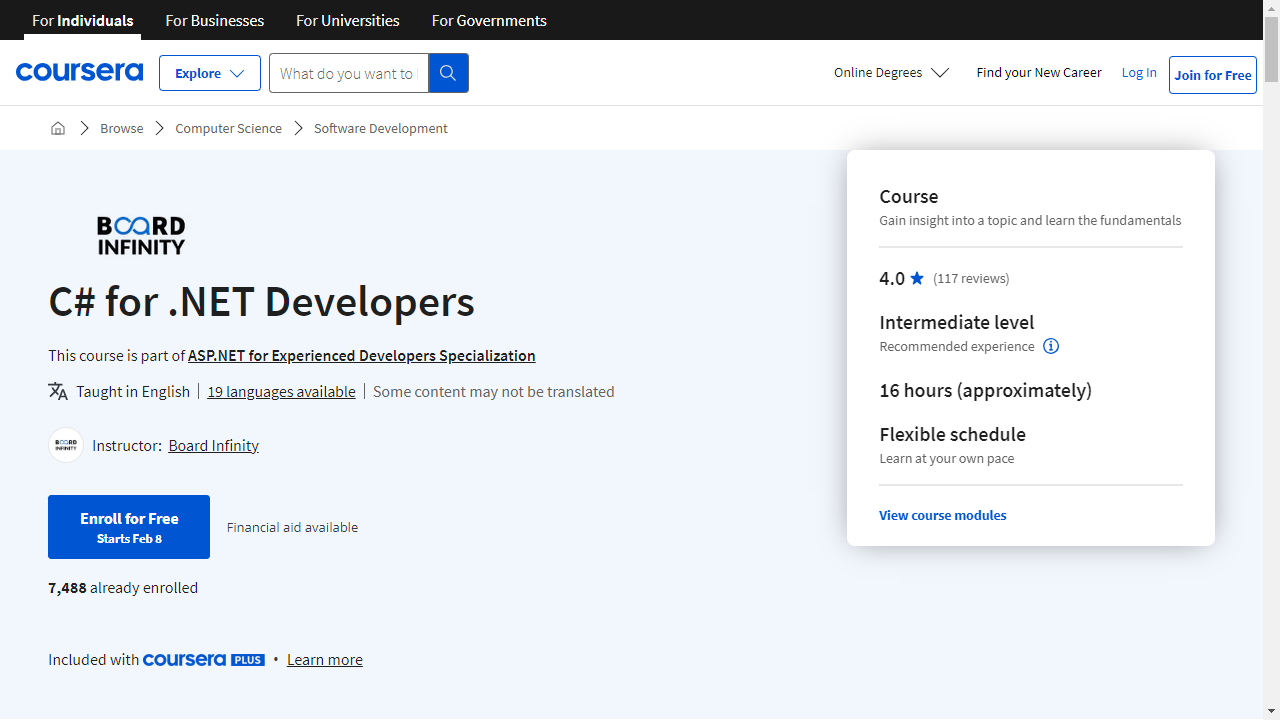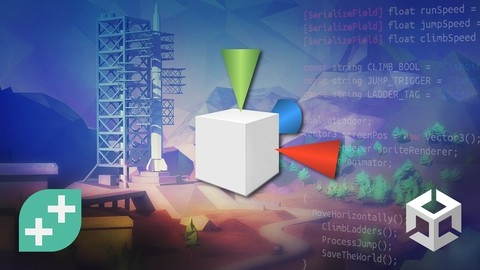C# (pronounced C sharp) is a versatile programming language developed by Microsoft.
It’s widely used for building various applications, including desktop applications, web applications, games, and mobile apps.
Learning C# can open doors to a wide range of career opportunities in software development.
By mastering C#, you can build robust and scalable applications, work with popular frameworks like .NET, and contribute to exciting projects across different domains.
However, finding the right C# course can be overwhelming, especially with the abundance of options available online.
You’re looking for a course that provides a strong foundation in the language, covers essential concepts, and offers practical exercises to solidify your understanding.
You might be seeking a course that focuses on specific aspects of C#, such as object-oriented programming or game development.
Based on our research and analysis, we believe that C# Intermediate: Classes, Interfaces and OOP on Udemy stands out as the best overall C# course.
This course provides a comprehensive introduction to object-oriented programming (OOP) in C#, covering essential topics like classes, inheritance, polymorphism, and interfaces, which are fundamental for building complex and well-structured applications.
It uses real-world examples and practical exercises to ensure a thorough understanding of these concepts.
While C# Intermediate: Classes, Interfaces and OOP is our top recommendation, we understand that you might have specific needs and preferences.
Therefore, we’ve compiled a list of other excellent C# courses that cater to different learning styles and goals.
Whether you’re a beginner or an experienced programmer, you’ll find a course that suits your level and interests.
So, keep reading to discover more options and embark on your C# learning journey!
C# Intermediate: Classes, Interfaces and OOP
Provider: Udemy
This C# Intermediate course jumps into the core of object-oriented programming (OOP).
You begin with classes, the building blocks of OOP.
You learn to create them, define their properties (like data they hold) and methods (actions they perform), and grasp the difference between a class (the blueprint) and an object (the actual instance).
You discover constructors, special methods for creating objects, and object initializers for quickly setting up your objects.
The course then tackles inheritance, where classes can inherit characteristics from other classes, promoting code reuse.
You will explore how to represent inheritance visually using UML diagrams and learn when to favor composition, which is like building a complex object from simpler ones, for a more flexible design.
The course uses real-world scenarios, like modeling a program like PowerPoint, to illustrate these concepts.
Finally, you delve into polymorphism, a powerful OOP concept that allows objects of different classes to be treated as if they were the same type.
You learn about abstract classes, which act as blueprints for other classes, and interfaces, which define contracts for classes to follow.
The course even introduces you to unit testing with the MS Tests framework, showing you how to write code that checks itself for errors, making your code more reliable.
C# Programming for Unity Game Development Specialization
Provider: Coursera
This specialization teaches you how to create video games using C# and Unity, popular choices for game development.
It’s structured like a college-level programming course, starting with the basics and moving to advanced object-oriented programming.
You begin by writing a C# console application and a Unity script, learning about variables, data types, classes, and objects - the building blocks of complex games.
You even get to build basic 2D games, learning how to write code that reacts to player input, makes decisions, and manages data.
The specialization then dives deeper into C#, introducing you to abstraction and how it’s used to design and implement classes.
You’ll gain a deeper understanding of methods and parameters and learn to add interactive elements like text output and sound effects to your games.
You’ll build upon the games you started earlier, putting your growing knowledge into practice.
You’ll then discover how to use files within your games and explore advanced concepts like inheritance and polymorphism, which help you write more efficient code.
You’ll learn about event handling, a crucial aspect of game development that allows you to create responsive and dynamic game experiences.
These skills will enable you to build more complex games with better designs.
Finally, you’ll work with a small Unity game from start to finish, putting all your learned skills into practice.
You’ll use what you’ve learned about file input/output, inheritance, polymorphism, and event handling to create a fully functional game, gaining experience and confidence in your abilities as a game developer.
Complete C# Unity Game Developer 2D
Provider: Udemy
If you’re looking to master C# for game development, this course is a great place to start.
You’ll begin by setting up your development environment with Unity 2021.1 and Visual Studio Code.
Don’t worry if you encounter any issues with intelliSense – the course provides solutions.
You’ll quickly jump into creating a simple platformer scene to familiarize yourself with the Unity interface.
The course then guides you through building four exciting 2D games, each introducing new programming concepts and Unity features.
In “Delivery Driver,” you’ll learn the fundamentals of C# programming, including methods, variables, and input handling using Input.GetAxis().
You’ll use Time.deltaTime() to ensure smooth movement across different computers and delve into colliders, rigidbodies, and essential methods like OnCollisionEnter2D() and OnTriggerEnter2D().
Moving on to “Snow Boarder,” you’ll work with Sprite Shapes to design a captivating track and use Surface Effector 2D to mimic a conveyor belt’s movement.
You’ll dive into particle effects, adding visual flair, and grasp the power of Cinemachine for dynamic camera work.
You’ll master techniques like using AddTorque() for rotations and Invoke() for delayed actions.
“Quiz Master” shifts your focus to UI development.
You’ll work with TextMeshPro, buttons, layout groups, and the power of Scriptable Objects for data management.
You’ll wrangle arrays and lists, becoming comfortable with for loops to control the flow of your game.
Finally, “TileVania” takes you deep into building a classic 2D platformer.
You’ll become proficient with Tilemap, using layers and rule tiles for intricate level design.
Animating your character becomes second nature as you utilize spritesheets and the Unity animation system.
You’ll implement jumping, climbing, and enemy interactions, making your game come alive.
You’ll use Rigidbody and Composite Collider for realistic physics and master Cinemachine for captivating camera movements.
.NET FullStack Developer Specialization
Provider: Coursera
This specialization equips you with the tools to become a .NET Full Stack Developer.
You will learn the fundamentals of C# programming, allowing you to build both the front-end and back-end of web applications.
The specialization starts by introducing you to ASP.NET and the .NET framework.
You will learn how to create dynamic web applications and write code using C#.
You will also cover basic programming concepts and learn about essential components like web forms and server controls.
With a foundation in place, you will then move on to master the fundamentals and advanced concepts of C# programming.
This includes learning about syntax, variables, control structures, LINQ, delegates, events, and object-oriented programming (OOP) principles.
Next, you will explore front-end development using HTML, CSS, JavaScript, and the React JavaScript library.
You will gain the skills to build interactive user interfaces, adding another layer to your skillset.
The specialization concludes by teaching back-end development using ASP.NET Core.
You will explore the MVC (Model-View-Controller) architecture, delve into RESTful web services and learn how to design and implement secure APIs using the HTTP protocol.
C# Basics for Beginners: Learn C# Fundamentals by Coding
Provider: Udemy
In this C# Basics course, you’ll start with the fundamentals of C# and the .NET Framework, understanding their differences and the role of the Common Language Runtime (CLR).
You’ll learn how to use Visual Studio, a powerful tool for building C# applications, and discover ReSharper, an extension that can enhance your coding speed and efficiency.
You’ll dive into the world of data types and expressions, mastering variables, constants, type conversions, operators, and commenting techniques.
The course teaches you how to declare and use arrays, strings, enums, and structs, providing a solid understanding of reference and value types and their impact on memory management.
You’ll learn to write code that makes decisions and repeats actions, mastering conditional statements like if/else and switch/case, and looping constructs like for, foreach, while, and do/while.
You’ll explore how to work with dates and times using DateTime and TimeSpan structures.
You’ll become proficient in manipulating text using the String class and learn how to improve performance using StringBuilder.
The course covers working with files and directories using the System.IO namespace, teaching you how to create, read, write, and manage them.
Finally, you’ll acquire valuable debugging skills using Visual Studio’s debugging tools, mastering breakpoints and variable inspection.
C# for .NET Developers
Provider: Coursera
This Coursera course equips you with the essentials of C# programming within the context of the .NET Core framework.
You begin by exploring the evolution and capabilities of .NET Core and how it contrasts with the earlier .NET Framework.
You’ll set up your coding workspace using VS Code and become familiar with the .NET CLI for managing .NET Core projects.
The course then guides you through the foundational elements of the C# language, including variables, data types, operators, conditional statements, loops, and arrays.
You will then transition into the world of object-oriented programming, understanding classes, objects, encapsulation, abstraction, constructors, and inheritance.
The course further explores advanced C# concepts like properties, indexers, enums, and exception handling techniques.
You will also delve into the realm of delegates, events, and anonymous methods, as well as lambda expressions and expression trees, which are crucial for modern C# development.
Finally, the course introduces asynchronous programming patterns within the .NET environment.
You’ll learn about various models such as the Asynchronous Programming Model (APM) and the Task-based Asynchronous Pattern (TAP), enabling you to write code that can efficiently manage multiple tasks concurrently.
This comprehensive curriculum will empower you to build real-world applications using C# and .NET Core.
Complete C# Unity Game Developer 3D
Provider: Udemy
This C# Unity course begins with the basics of setting up your development environment using Unity and VS Code.
You’ll learn fundamental programming concepts like variables, methods, and conditional statements.
The course then dives into game development with your first game, an “Obstacle Course.”
Here, you’ll use Input.GetAxis to control player movement, create collisions with box colliders, and implement a scoring system using OnCollisionEnter().
Next, you’ll build a rocket game called “Project Boost”, which introduces more advanced C# concepts, including classes, switch statements, and object pooling.
You’ll work with Unity’s Input System, implement audio and particle effects, and learn about the SceneManager class to manage game levels.
You’ll also discover how to build and publish your game.
The course then challenges you to create “Argon Assault”, a rail shooter game where you’ll use Unity’s Timeline tool.
This section covers terrain creation, texturing, adding trees, and working with the Unity Asset Store.
You’ll delve into advanced gameplay mechanics like weapon switching and ammo pickups.
You’ll then create “Realm Rush,” a tower defense game.
You’ll learn about grid snapping, implement pathfinding algorithms (specifically the breadth-first search), and work with Unity’s UI system.
The course covers object pooling and currency systems for resource management and balancing gameplay.
Finally, you’ll tackle “Zombie Runner,” a first-person shooter.
This section teaches first-person movement and shooting mechanics using raycasting and NavMeshAgent for AI-controlled enemies.
You’ll create weapons, ammo pickups, manage enemy health, and work with ProBuilder to design levels and props.
You’ll also explore the Unity Animator to bring your characters to life.
Also check our posts on:
